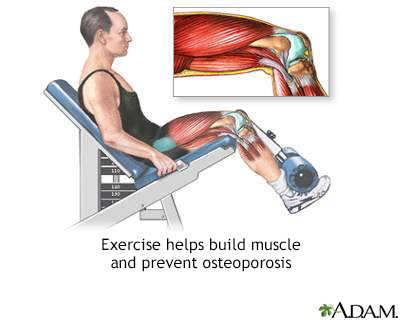Stay active and exercise when you have arthritis
Arthritis - exercise; Arthritis - activityWhen you have arthritis, being active is good for your overall health and sense of well-being.
Exercise keeps your muscles strong and increases your range of motion. (This is how much you can bend and flex your joints). Tired, weak muscles add to the pain and stiffness of arthritis. Exercise can also help increase your metabolism and avoid weight gain which is worse for arthritic joints.
Choose From These Activities
Stronger muscles also help you with balance to prevent falls. Being stronger can give you more energy, and help you lose weight and sleep better.
If you will be having surgery, exercising can help you stay strong, which will speed up your recovery. Water exercises may be the best exercise for your arthritis. Swimming laps, water aerobics, or even just walking in the shallow end of a pool all make the muscles around your spine and legs stronger.
Ask your health care provider if you can use a stationary bike. Be aware that if you have arthritis of the hip or knee cap, biking can worsen your symptoms.
If you are not able to do water exercises or use a stationary bike, try walking, as long as it does not cause too much pain. Walk on smooth, even surfaces, such as the sidewalks near your home or inside a shopping mall.
Ask your physical therapist or provider to show you gentle exercises that will increase your range of motion and strengthen the muscles around your knees.
Be Careful
As long as you do not overdo it, staying active and getting exercise will not make your arthritis get worse faster.
Taking acetaminophen (such as Tylenol) or another pain medicine before you exercise is OK. But do not overdo your exercise because you took the medicine.
If exercise causes your pain to worsen, try cutting back on how long or how hard you exercise the next time. However, don't stop completely. Allow your body to adjust to the new exercise level.
References
Cuccurullo SJ, Joki J, Luke O. Introduction to physical medicine and rehabilitation. In: Firestein GS, Budd RC, Gabriel SE, Koretzky GA, McInnes IB, O'Dell JR, eds. Firestein & Kelley's Textbook of Rheumatology. 11th ed. Philadelphia, PA: Elsevier; 2021:chap 41.
Hsieh LF, Mao HF, Lu CC, Hsu WL. Rheumatologic rehabilitation. In: Cifu DX, ed. Braddom's Physical Medicine & Rehabilitation. 6th ed. Philadelphia, PA: Elsevier; 2021:chap 31.
Misra D, Kumar D, Neogi T. Treatment of osteoarthritis. In: Firestein GS, Budd RC, Gabriel SE, Koretzky GA, McInnes IB, O'Dell JR, eds. Firestein & Kelley's Textbook of Rheumatology. 11th ed. Philadelphia, PA: Elsevier; 2021:chap 106.
Aging and exercise - illustration
Exercise, such as weightlifting, helps build muscle that is usually lost with age and puts stress on bones which helps keep them strong and healthy.
Aging and exercise
illustration
- Exercise - InDepth(In-Depth)
- Rheumatoid arthritis(Alt. Medicine)
- Osteoarthritis - InDepth(In-Depth)
- Weight control and diet - InDepth(In-Depth)
- Heart failure(Alt. Medicine)
- Crohn disease(Alt. Medicine)
- Fibromyalgia - InDepth(In-Depth)
- Coronary artery disease - InDepth(In-Depth)
- Psoriasis-In-Depth(In-Depth)
- Foot pain - InDepth(In-Depth)
Review Date: 8/12/2023
Reviewed By: C. Benjamin Ma, MD, Professor, Chief, Sports Medicine and Shoulder Service, UCSF Department of Orthopaedic Surgery, San Francisco, CA. Also reviewed by David C. Dugdale, MD, Medical Director, Brenda Conaway, Editorial Director, and the A.D.A.M. Editorial team.



